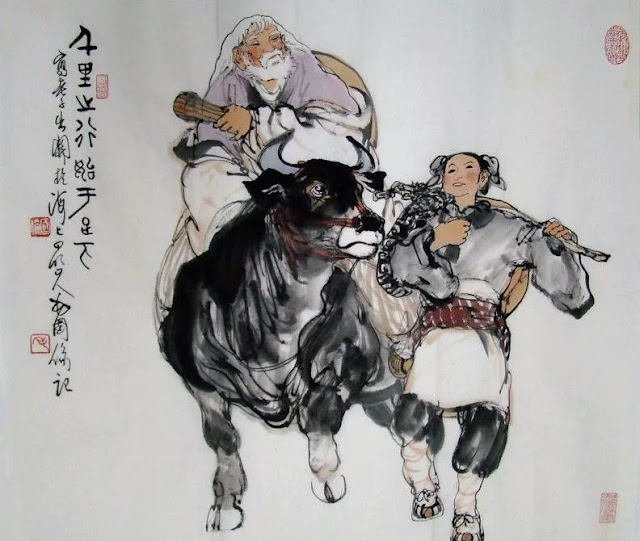小大為一
Sunday, February 28, 2021
"Don’t fight against the things that hurt you, but LOVE goodness, love honour, love patience.
Divine love may bring the knowledge, the understanding, and the wisdom to those things that bring self in alignment with Creative Forces."
― Edgar Cayce (ECRL 1215-4)
《道德經》第64章
其安易持,其未兆易謀。
其脆易泮,其微易散。
為之於未有,治之於未亂。
合抱之木,生於毫末;九層之臺,起於累土;千里之行,始於足下。
為者敗之,執者失之。
是以聖人無為故無敗;無執故無失。
民之從事,常於幾成而敗之。
慎終如始,則無敗事,是以聖人欲不欲,不貴難得之貨;學不學,復衆人之所過,以輔萬物之自然,而不敢為。
64 ― James Legge (Guarding the minute)
That which is at rest is easily kept hold of; before a thing has given indications of its presence, it is easy to take measures against it; that which is brittle is easily broken; that which is very small is easily dispersed. Action should be taken before a thing has made its appearance; order should be secured before disorder has begun.
The tree which fills the arms grew from the tiniest sprout; the tower of nine storeys rose from a (small) heap of earth; the journey of a thousand li commenced with a single step.
He who acts (with an ulterior purpose) does harm; he who takes hold of a thing (in the same way) loses his hold. The sage does not act (so), and therefore does no harm; he does not lay hold (so) and therefore does not lose his bold. (But) people in their conduct of affairs are constantly ruining them when they are on the eve of success. If they were careful at the end, as (they should be) at the beginning, they would not so ruin them.
Therefore the sage desires what (other men) do not desire, and does not prize things difficult to get; he learns what (other men) do not learn, and turns back to what the multitude of men have passed by. Thus he helps the natural development of all things and does not dare to act (with an ulterior purpose of his own).
64 ― Arthur Waley
“What stays still is easy to hold;
Before there has been an omen it is easy to lay plans.
What is tender is easily torn,
What is minute is easy to scatter.”
Deal with things in their state of not-yet-being,
Put them in order before they have got into confusion.
For “the tree big as a man's embrace began as a tiny sprout,
The tower nine storeys high began with a heap of earth,
The journey of a thousand leagues began with what was under the feet”.
He who acts harms; he who grabs lets slip.
Therefore the Sage does not act, and so does not harm;
Does not grab, and so does not let slip.
Whereas the people of the world, at their tasks,
Constantly spoil things when within an ace of completing them.
“Heed the end no less than the beginning,”
And your work will not be spoiled.
Therefore the Sage wants only things that are unwanted,
Sets no store by products difficult to get,
And so teaches things untaught,
Turning all men back to the things they have left behind,
That the ten thousand creatures may be restored to their Self-so.
This he does, but dare not act.
Dào De Jing Chapter 64 - Herman Ould
That which is motionless can be easily held;
That which has not been forecast can be easily planned;
That which is still tender can be easily broken;
That which is minute can be easily scattered.
Take things in hand before they come into existence;
Put things in order before they are in a state of confusion.
The tree which fills your arms' embrace brew from a tine shoot;
The nine-storey tower arose from a heap of earth.
The journey of a thousand miles began with the spot of earth covered by one's own feet.
He who acts, spoils. He who grasps loses.
The Sage does not act: therefore he does not spoil things.
He does not grasp; therefore he does not lose things.
But ordinary people, eagerly going about their business,
Often fail when they are on the verge of succeeding.
Keep watch on the end as well as on the beginning;
Then you will not fail.
Therefore the Sage:
Desires only the undesiring;
He does not value things that are hard to come by.
He learns how not to learn,
Turning back to those things which others have passed through,
And thus helps all creatures to fulfil their own natures.
But he does not venture to act.
生詞本
【成語】千里之行,始於足下【qiān lǐ zhī xíng shǐ yú zú xià】
【釋義】走一千里路,是從邁第一步開始的。比喻事情總是從頭開始,逐步發展的。
【出處】老子·《道德經》·第六十四章:“合抱之木,生於毫末;九層之台,起於壘土;千里之行,始於足下。千里之行,始於足下。”
【近義詞】積少成多
【反義詞】好高騖遠
【例句】古人說“千里之行,始於足下”,你還是踏踏實實地學習吧。
老子是春秋時期著名的哲學家,關於他的名字有很多有趣的傳說。
據說老子的母親理氏有一天正在村頭的河邊洗衣服,忽然看見上游飄下一個黃澄澄的李子。理氏忙用樹枝將這個拳頭大小的黃李子撈了上來。到了中午,理氏又熱又渴,便將這個李子吃了下去。從這之後,理氏便懷了孩子。
理氏懷了八十一年的胎,生下一個男孩。這男孩一生下來就白眉白髮,白白的大絡腮鬍子。因此,理氏給他取的名字就叫“老子”。老子生下來就會說話,他指著院子中的一棵李子樹,對母親說:“李就是我的姓。”
後來,老子做過周朝的官。這是一個管理藏書的官職,因為這個緣故,老子知識淵博,在當時名聲很大。孔子年輕時曾經專門拜訪過老子,向他請教周朝的禮儀。
老子寫過一本只有五千字的書,名字是《道德經》。書中講了很多能啟發人的道理。老子說:“合抱之木,生於毫末;九層之台,起於累土;千里之行,始於足下。”意思是說,雙臂合抱的大樹,是從細小的幼芽開始長成的;很多層的高台,是從第一筐泥土開始壘起來的;千里遠的路程,是從腳下第一步開始才能走完的。
在這裡,老子用生動的事例,說明事物都是從小到大發展變化的道理


No comments:
Post a Comment